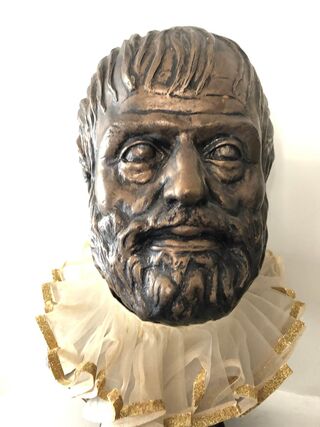Happiness
Is Aristotelian Happiness Really Out-of-Style?
A Personal Perspective: The "reverse bucket list" and one other option.
Posted February 10, 2022 Reviewed by Lybi Ma
Key points
- When we experiment with formulas for happiness, why not try virtue ethics?
- Eudaimonist virtue ethics suggests that the only way to be happy is to be ethical.
- Being ethical, on the virtue ethics model, requires aiming for ethics in all that you do.
- A focus on short or mid-term values is what makes us dissatisfied, according to eudaimonist virtue ethics.
The Atlantic has just published a new article by Arthur Brooks on “How to Want Less: The secret to satisfaction has nothing to do with achievement, money, or stuff.” Brooks has been on the happiness beat for a while. A professor at the Harvard Kennedy School and Professor of Management Practice at Harvard Business School, his books on happiness have been best-sellers. Familiar with the psychological theories developed over time to explain happiness, he uses them to assess his own, surprising early, achievement of his personal bucket list. After achieving it all, and finding dissatisfaction still a struggle, he began to figure out a way to “work backward,” removing rather than adding things to any such list.
I have worried about bucket list thinking on life here before (see this post). It is at odds with the lessons we can glean from virtue ethics in several different ways. But Brooks’s new essay is an interestingly new criticism of bucket list thought, especially since he has gotten to the point so few of us have: completing his list. From this vantage, he has the authority to explain that living well is not just achieving all of the good things that appeal to us. We should, he argues in the essay, disassemble our ideas about being satisfied by having more things or even achievements. He gives examples of the disappointment he’s seen great figures like LeBron James experience; he reports on other successes who admit satisfaction does not stick around long after a win. We keep wanting more anyway. It never ends. We are like leaky sieves (that was Plato's point in the Gorgias). Though Brooks does not mention them, the ancient philosophers argued on these topics a lot, making some of the very same points.

In fact, what is most interesting to me is that Brooks does not even test out the advice we get from virtue ethics (ancient or modern) about happiness. It is not that I expect every author to read Plato, Aristotle, the Stoics, or the Epicureans, but even independent of this influence, we might think “trying to be ethical” is a good practical option, one worth trying or at least listing.
I did not, in other words, know this ancient advice had fallen this out of style.
Rather than invoke virtue ethics, Brooks suggests that evolution led to us being rather chronically dissatisfied (there are social perks that come from us always looking around for more). He recommends Taoism and eliminating our desire until there is none. He also suggests that if we “do not accumulate more to represent ourselves” we might get to “strip things away to find our true selves.” (This seems to differ from Taoism; I will count it as a second bit of advice.) He describes using a “reverse bucket list,” where you try to limit your desires and appreciate intrinsic inputs to your life. Finally, he praises the benefits of a simple life (Taoism does too). And as an example, he texts his daughter notes that have nothing to do with work or school and finds it the highlight of his day. They are shared moments of true happiness.
He concludes, “Each of us can ride the waves of attachments and urges, hoping futilely that someday, somehow, we will get and keep that satisfaction we crave. Or we can take a shot at free will and self-mastery. It’s a lifelong battle against our inner caveman. Often, he wins. But with determination and practice, we can find respite from that chronic dissatisfaction and experience the joy that is true human freedom.”
There are a lot of concepts invoked in even this last paragraph (attachments, urges, hope, craving, satisfaction, free will, self-mastery, the inner caveman, joy, true human freedom). As someone who teaches philosophy, I can be pretty certain that one small classroom would not agree on the definitions of each of these, let alone share an understanding of what role they are to play alongside each other. This is why I wish philosophy were used as a resource more often when it comes to happiness. We need it even for the concepts involved in making a recommendation.
Among the theories of virtue ethics being developed today, one is still referred to by the ancient Greek term "eudaimonism," which is happiness. It suggests that when our lives are to be organized around being happy (following the advice of Plato, Aristotle, the Stoics, the Epicureans) we are not fighting an inner caveman. We are not stomping out all desire, or even aspiring to that.
We are, instead, pictured as overcoming merely short-term interests and pleasures (these do, eudaimonism maintains, create a “satisfaction dilemma” as Brooks describes) in the sense that we no longer take them to substitute for long-term goals. And these virtue ethicists suggest that we actually have the ability to come to act in ways we approve of long-term. (See how behavioral science might support these ideas here.) Doing this, however, actually takes a ton of thought, as we have to think through (and then practice) behavior that we think is right. The result of this practice and trial and error can be a kind of happiness that is very unlike the feeling of just winning a game or realizing you are at the end of a bucket list. Once you gain eudaimonist happiness (which Aristotle thinks must be possible for us, mortal and flawed as we are) you do not lose it, because it is not a feeling that passes but a new, full, thorough, final understanding of our choices in life.
Brooks’s description of his love for his daughter, their sweet daily text communications, can be squarely fit into virtue ethic’s account of happiness. And that is an advantage, if we are comparing accounts, because not everyone who fails to talk about work or school is experiencing pleasure. Some of Brooks's readers might try to follow his advice and find it just does not work. They are doing what they were told, living simply, not focused on work or school, studying Taoism, but feeling just the same.
The eudaimonists would swoop in at this point: We know what is missing. We can only be happy when we are ethical, they tell us. It’s when we are doing what we think we should that we feel great. You can't be happy without thinking hard about what you should be doing, it just bugs us too much if we skip that part. That's the part of the formula that makes the rest work, that puts our pleasure in sync with our "true selves." Otherwise, they tell us, we know we are missing something and we feel it. And in a way, what we are missing is just reflection like that Brooks models for us, but the type that gets to this conclusion: We are only satisfied if we aim to be ethical.
If happiness is a struggle, if the bucket list did not work, if the reverse bucket list is not quite doing it, if you just can't get the hang of Taoism yet, give this other philosophical path a try.




